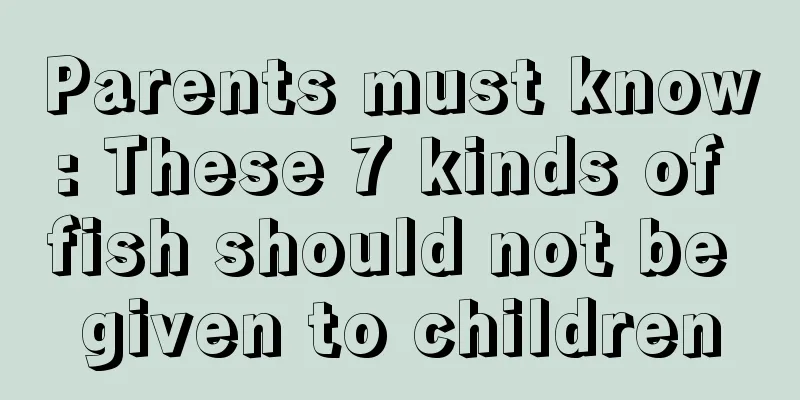Parents must know: These 7 kinds of fish should not be given to children

|
Children whose bodies are still developing can supplement their nutrition and grow more healthily by eating more fish. However, parents should be wary of some fish. The more they eat, the better. Some fish should not even be given to children. Experts say young parents should be wary of seven types of fish - shark, swordfish, marlin, tilapia, tilefish and catfish. Try to avoid giving these fish to children. In addition to their relatively large size, these fish are also carnivorous fish with a longer life cycle and have higher levels of mercury in their bodies than other fish. The U.S. Food and Drug Administration (FDA) has also issued a warning to avoid feeding children large predatory fish including shark, swordfish, king mackerel, tilefish, etc. because of their high mercury content. For tuna, which is often eaten by many families, the FDA recommends that if it is canned, it can be eaten 1-2 times a week, and fresh tuna should not be eaten more than once a week. Tilapia, which is a long-lived fish, has higher levels of mercury than other fish. The same goes for catfish, which has high levels of mercury. For the health of your children, it is better to eat less. When can babies eat fish? Fish has been named one of the common food allergy factors by the American Academy of Allergy Asthma & Immunology, so many experts recommend that children should not eat fish until they are one year old. At this time, the child's immune system and digestive system are better developed and they are more likely to accept fish. 4% to 6% of infants and children suffer from food allergies, so if your family has a history of allergies, such as hay fever, asthma, or food allergies, experts recommend waiting until your child is at least 3 years old before eating fish. Don't let your baby eat fish if it's not cooked thoroughly. If you often eat uncooked or raw fish, you may suffer from parasitic diseases, loss of appetite, abdominal pain, liver enlargement, jaundice, edema and even ascites in severe cases. Because parasites are often found in fresh fish, especially freshwater fish. Therefore, when parents cook fish, they must make sure it is cooked thoroughly and not let babies eat raw fish or undercooked fish. Fish floss has high nutritional value, is easy to eat, and there is no need to worry about fish bones. Parents may think this is the best way for babies to eat fish. Therefore, some parents let their babies eat a lot of fish floss: mix it with porridge, noodles, or give it to their babies as snacks. However, studies have shown that the fluoride content in fish floss is relatively high. If parents feed their baby 10 to 12 grams of fish paste every day, the baby will absorb 8 to 16 mg of fluoride from the fish paste. Add to that the fluoride intake from water and other food every day, and the amount of fluoride in the baby's body can easily exceed the safety value. |
<<: 6 golden personalities that children must have
>>: Parents should be careful that their children may get "kissing disease" after being kissed
Recommend
Nursing methods for children with high fever convulsions
Once a child has a high fever that does not subsi...
Can myopia in children be corrected?
If a young child is nearsighted, it can easily le...
Which department should I go to for breast development in children?
In our lives, many children are particularly pron...
The role of acupuncture in the treatment of cerebral palsy in children
Cerebral palsy in children is currently a common ...
Reasons why babies have yellow-green stools
The baby's health has always been the most co...
What to do if children have toothache
Children nowadays do not pay attention to their p...
Diet therapy for recurrent cough in children
Recurrent coughing in children is a common diseas...
What should I do if my baby sneezes and has a runny nose?
Sneezing is usually accompanied by a runny nose. ...
How to deal with eye discharge in children, mothers need to read
If a child has eye mucus, mothers should pay atte...
Autistic children go to school
In fact, children with autism will encounter very...
What is the height and weight of an 18-month-old baby?
Babies have different growth and development at d...
What causes high white blood cell count in children’s urine test?
When children go to the hospital for a physical e...
Causes of precocious puberty in children
Children nowadays are not as innocent as before. ...
Down syndrome screening method
Many parents have heard of Down syndrome, a disea...
Is it a big deal if a child has lymph nodes?
Lymph nodes are an important organ in our human b...









